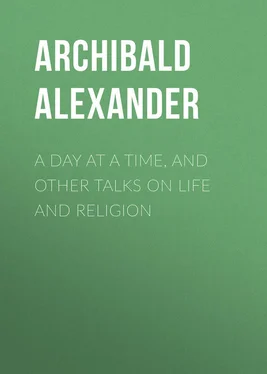Archibald Alexander - A Day at a Time, and Other Talks on Life and Religion
Здесь есть возможность читать онлайн «Archibald Alexander - A Day at a Time, and Other Talks on Life and Religion» — ознакомительный отрывок электронной книги совершенно бесплатно, а после прочтения отрывка купить полную версию. В некоторых случаях можно слушать аудио, скачать через торрент в формате fb2 и присутствует краткое содержание. ISBN: , Жанр: foreign_antique, foreign_prose, на английском языке. Описание произведения, (предисловие) а так же отзывы посетителей доступны на портале библиотеки ЛибКат.
- Название:A Day at a Time, and Other Talks on Life and Religion
- Автор:
- Жанр:
- Год:неизвестен
- ISBN:http://www.gutenberg.org/ebooks/39309
- Рейтинг книги:5 / 5. Голосов: 1
-
Избранное:Добавить в избранное
- Отзывы:
-
Ваша оценка:
- 100
- 1
- 2
- 3
- 4
- 5
A Day at a Time, and Other Talks on Life and Religion: краткое содержание, описание и аннотация
Предлагаем к чтению аннотацию, описание, краткое содержание или предисловие (зависит от того, что написал сам автор книги «A Day at a Time, and Other Talks on Life and Religion»). Если вы не нашли необходимую информацию о книге — напишите в комментариях, мы постараемся отыскать её.
A Day at a Time, and Other Talks on Life and Religion — читать онлайн ознакомительный отрывок
Ниже представлен текст книги, разбитый по страницам. Система сохранения места последней прочитанной страницы, позволяет с удобством читать онлайн бесплатно книгу «A Day at a Time, and Other Talks on Life and Religion», без необходимости каждый раз заново искать на чём Вы остановились. Поставьте закладку, и сможете в любой момент перейти на страницу, на которой закончили чтение.
Интервал:
Закладка:
And I do not know what we have been thinking of that we have not oftener made use of this as Christ's claim for Himself, that we have not told the ignorant and the very poor especially, who know far more about the Doctor than they do about the Church, who are, in fact, shy of all that is priestly, but who do understand and appreciate the Doctor, I say, I do not know why we have not oftener told them to forget that Jesus is the King and Head of the Church and remember only that He is the best of all Physicians. That Christ is compassionate, sympathetic, and approachable, like the Doctor, would be veritable good news to many a poor ignorant soul who is mightily afraid of His priests.
The word which comes to our lips when we seek to characterise the life and work of the true Doctor is Christlike. And big as the title is, it is deserved. In sacrifice and self-forgetfulness, in his care most for those who most need him, in the way he identifies himself with his patient, bearing with, because understanding, his weakness and petulance and fears, and seeking all the while only to heal and help and save him, there is no more Christlike character or calling in the modern world than the Doctor.
I am the happy possessor of an engraving-a gift from one whose calling is to teach doctors-of Luke Fildes' famous picture. Most of you doubtless are familiar with it. It represents the interior of a humble home where a little child lies critically ill. The father and mother, distracted with grief, have yielded their place beside the couch to the Doctor, who sits watching and waiting, all-absorbed in the little one's trouble. It is a noble face, strong, compassionate, resourceful, gentle; and if the Eternal Christ of God is to be represented to us in His strength and gentleness by any human analogy or likeness whatever, as He wished to be, and indeed must be, no finer figure could be found, I think, than that, none more certain to draw out the reverence and gratitude and trust of men.
Men of all grades and classes appeal to and trust the Doctor. But how many of them realise that Jesus desires that men should come to Him and trust His willingness to help and save them, just as they would do to some good physician? How many men who have found comfort by taking their fears and forebodings to the Doctor and hearing his authoritative "Go in peace!" know or realise that just so would Jesus have us bring Him our unworthiness and shame and sin? Jesus never preached at those whom His compassion drew to Him. He never lectured them, He just helped them, and that at once. He lifted them to their feet and gave them a new hope. He, straightway, in God's name, assured them of forgiveness.
Ah, if men only understood that Jesus is to be found to-day down among the world's burdened and weary souls, not as a Priest begirt with ceremony and aloof from daily life, but as a Physician, approachable, helpful, human, who sees and pities their weakness, and longs to save them and help them to their best. If men only understood that!
We come to Thee, Thou Good Physician, with all our ills and fears. We would whisper in Thine ear the troubles that frighten and shame us. Surely Thou wilt hear. Draw near us in Thy strength and Pity, and in Thy Mercy heal us all. Amen.
" Whatsoever thy hand findeth
to do, do it with thy might,
for there is no work nor device
nor knowledge nor wisdom in
the grave whither thou goest. "
(ECCLESIASTES ix. 10.)VI
WELL AND NOW
In popular and condensed form, the golden rule according to Ecclesiastes is, "Do it well and do it now." His own words are, "Whatsoever thy hand findeth to do, do it with thy might, for there is no work nor device nor knowledge nor wisdom in the grave whither thou goest." We want to let that precept soak into our minds for a little.
DO IT WELL. "Whatsoever thy hand findeth to do, do it with thy might." Among the lesser joys of life there are few that thrill one with a more pleasurable sense of satisfaction than that which goes with the bit of work finished, rounded-off and done as well as one can do it. No matter what the job may be, if it is worth doing at all, or if it is one's business to do it, it is not difficult to recognise in the curious inward glow over its honourable completion, a token of God's good pleasure, some far-off echo of His "Well done!"
It is a truism which never loses its point that it is enthusiasm that commands success. In her weird book called "Dreams," Olive Schreiner tells the parable of an artist who painted a beautiful picture. On it there was a wonderful glow which drew the admiration of all his compeers, but which none could imitate. The other painters said, Where did he get his colours? But though they sought rich and rare pigments in far-off Eastern lands they could not catch the secret of it. One day the artist was found dead beside his picture, and when they stripped him for his shroud they found a wound beneath his heart. Then it dawned upon them where he had got his colour. He had painted his picture with his own heart's blood! It is the only way to paint it, if the picture is to be worth while at all. If we would have the work that we do live and count, our heart's blood must go into it. Whatsoever thy hand findeth to do, do it with thy might.
What magnificent heart-stirring examples are coming to us every day just now, from sea and battle-field, of the good old British virtue of sticking in gamely to the end and "seeing the thing through!" If the stories of the old English Admirals are calculated, as Stevenson says, to "send bank clerks back with more heart and spirit to their book-keeping by double entry," shall not the story that unfolds day by day of what our own kith and kin are doing, nerve and inspire us all to "do OUR bit," to face up to OUR duty, humdrum and ordinary though it be, with the same grit and energy, with the same determination to see it through, and make as good a job of it as we can?
The Preacher has his reason for this advice. Because, he says, some day you will have to stop and lay down your tools, and that will be the end. No more touching botched work after that. No going back to lift dropped stitches then. Such as it is, your record will have to stand as you leave it, when Death raps at your door. Even for us in this Christian age, this ancient Preacher's reason still stands valid and solemn. Do what you are at now as well as ever you can, for you shall pass that way no more again for ever.
The Apostle Paul, who expresses practically the same sentiment, gives a different reason. "Whatever ye do," he writes to the Colossians, "do it heartily as to the Lord." And that is the point for you and me. Not merely because we have a limited time to work, but because our work is Christ's service, we must do it heartily, with all our might. It is to the Lord. To us all in our different labours, in the things we work at day by day, and the worthy interests we endeavour to support, there comes this call that transforms the very commonest duty into an honourable obligation to a personal living Master-Whatever ye do, do it heartily as to the Lord.
Yes, and DO IT NOW. For the amount of misery and suffering and remorse that is directly due to putting off the God-given impulse or generous purpose to some other season, is simply incalculable. If all the kind letters had been written when the thought of writing was fresh and insistent-ah me, how many burdened souls would have been the braver and the stronger. If only the friendly visit had been paid when we thought about it-and why wasn't it? "Never suppose," says Bagshot, "that you can make up to a neglected friend by going to visit him in a hospital. Repent on your own death-bed, if you like, but not on another's."
Читать дальшеИнтервал:
Закладка:
Похожие книги на «A Day at a Time, and Other Talks on Life and Religion»
Представляем Вашему вниманию похожие книги на «A Day at a Time, and Other Talks on Life and Religion» списком для выбора. Мы отобрали схожую по названию и смыслу литературу в надежде предоставить читателям больше вариантов отыскать новые, интересные, ещё непрочитанные произведения.
Обсуждение, отзывы о книге «A Day at a Time, and Other Talks on Life and Religion» и просто собственные мнения читателей. Оставьте ваши комментарии, напишите, что Вы думаете о произведении, его смысле или главных героях. Укажите что конкретно понравилось, а что нет, и почему Вы так считаете.












